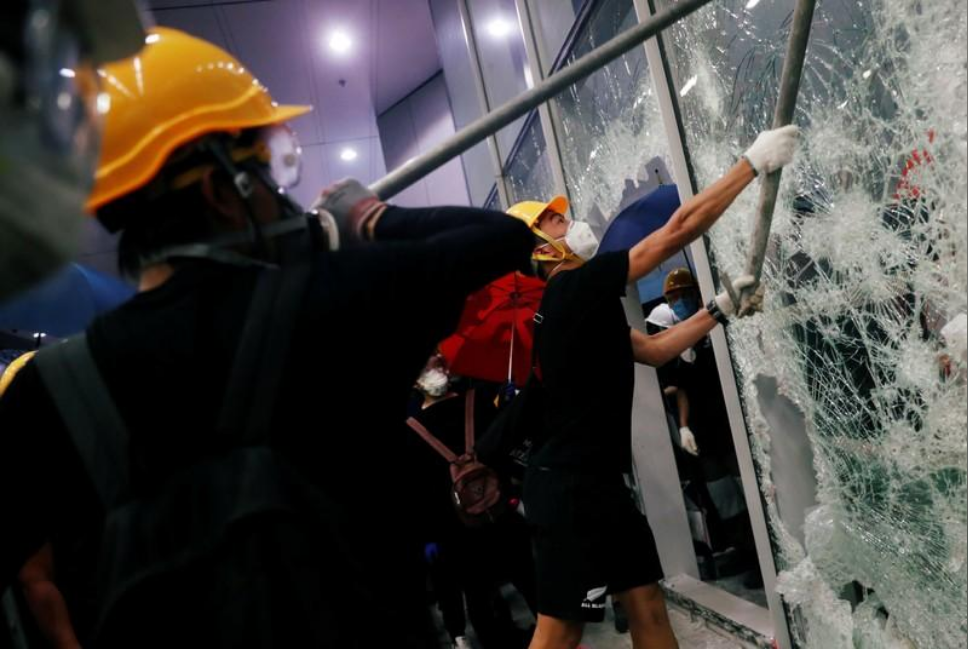
Editor's note: John Gong is a research fellow at Charhar Institute and professor at the University of International Business and Economics. The article reflects the author's opinion, and not necessarily the views of CGTN.
If there is any doubt that the demonstrations in Hong Kong are starting to brew elements of terrorism, the arrest of a FedEX pilot in Guangzhou this week should put any such doubt to rest.
Previously, we have seen these Hong Kong protestors in black ransacked subway stations, sabotaged building glasses and set fire on streets. If these acts are not alarming enough, the latest news is that they have started to throw objects on the railway in a clearly deliberate attempt to derail trains.
This is not just a few disgruntled young men going out of control. Terrorism is indisputably the right word to characterize such heinous acts.
But the arrest of Todd A. Hohn, a former U.S. Air Force pilot and now a FedEX pilot, has taken the matter to a whole new level, as it appears to indicate that this emerging terrorism in Hong Kong sees a possible foreign connection.
Hohn was caught in Guangzhou, while waiting to catch a flight to his home in Hong Kong, with his luggage carrying a box containing 681 of what the authority termed as "nonmetallic pellets used in low-power replica air guns." He is detained on allegations of smuggling weapons and ammunition, a criminal charge that could have him face up to seven years of imprisonment if convicted. Hohn was later released on bail and put in a hotel room pending trial.
Certainly 681 air gun pellets are not going to be used for hunting game birds, especially in Hong Kong as one of the most densely populated metropolises in the world. Setting the arms smuggling charge aside, what are these air gun pellets going to be used for at a time like this?

Protesters break into the Legislative Council building, Hong Kong, China, July 1, 2019. /Reuters Photo
Protesters break into the Legislative Council building, Hong Kong, China, July 1, 2019. /Reuters Photo
It doesn't take too much of a stretch in imagination to suggest that Hohn may be acting as a courier for some potential terrorists in Hong Kong. Believe it or not, air guns are indeed something that have been spotted in the hands of some protesters in black on the streets.
With the 70th anniversary of the founding of People's Republic of China coming soon on October 1, rumor has it that something "extraordinary" from the demonstration side will happen on that day in Hong Kong. Does this box of 681 air gun pellets have any connection to that? It is a legitimate question to ask.
For Hohn, the only hope for leniency is to tell the truth and the whole truth. Who handed him this ammunition box? Who is it supposed to be handed to after arriving in Hong Kong? Is any foreign government involved in this? These are key questions that Hohn needs to honestly answer if he hopes to get out of this mess unscathed.
There is mounting evidence so far that foreign governments have been involved in this round of local politics in Hong Kong. Even the Taiwan leader Tsai Ing-wen has been accused of providing shelter to key activists and covert funding to opposition parties. Now it is time to ask if she has harbored terrorism in Hong Kong. If so, wait to face the consequences.
In a way this is also a wake-up call for the SAR government and the police department in Hong Kong. "Violent protests" is an underestimate to describe some of the street hooligans they are dealing with. So far, the Hong Kong police have demonstrated utmost restraint. However, terrorism is now surfacing in Hong Kong, and it needs to be dealt with in a forcible language that terrorists can understand.
(If you want to contribute and have specific expertise, please contact us at opinions@cgtn.com.)